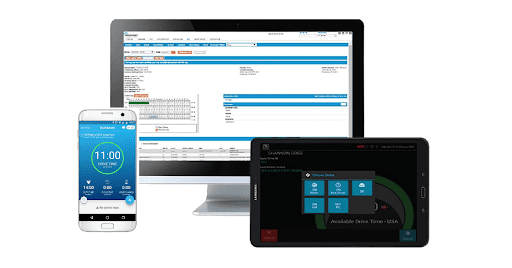Electronic logging devices (ELDs) are mandatory for most commercial vehicles operating in the U.S., with only a few exceptions. Even if your fleet isn’t required to use an ELD, the insight and savings they offer for medium-sized fleets make them an important tool for business growth.
The fundamentals of any fleet come down to efficiency, safety, compliance and cost. ELDs can help improve performance on these fronts. Find out why an ELD system could be the next step for your business below.
Why do medium-sized carriers need ELD systems?
In nearly all cases, medium-sized carriers need electronic logging devices (ELDs) to ensure compliance with the Federal Motor Carrier Safety Administration’s (FMCSA) Hours of Service (HOS) regulations. These regulations are in place to make the highways safer for everyone. They aim to help prevent driver fatigue and reduce the risk of accidents caused by overworking.
ELDs provide an automated way for carriers to track, monitor and report their drivers. They can encourage safe driving behaviors while optimizing fleet and driver efficiency. If your fleet’s goals include more on-time deliveries, lower costs and less paperwork, ELD systems are the way to go.
5 advantages of ELD systems for medium carriers
Carriers around the world have experienced the advantages of ELD systems for streamlining their operations. Are you ready to see whether ELD systems can work for you? Five key advantages are outlined below:
Improved fleet efficiency
Medium-sized carriers can use ELDs to monitor vehicle performance and driver behavior, which can help to optimize their operations and maximize fuel efficiency. By providing real-time data on engine performance and fuel consumption, ELDs allow carriers to identify areas for improvement, including excess idle time and route optimization. This can lead to significant cost savings in fuel and labor costs.
Fleet owners can also use ELD data to identify and minimize human error or deferred maintenance, potentially averting costly accidents. With ELDs, operators can cut back significantly on paper use, which is more environmentally friendly, cost-efficient and saves time.
Taken together, ELD systems, dashcams and telematics are powerful tools for reducing operational inefficiencies. Electronic logging devices can be the first step toward reducing costs, increasing productivity and taking on more loads.
Reduced paperwork
Paperwork is the bane of many fleet managers’ existence. Reduce or eliminate it with ELD systems. Most drivers will also be relieved to eliminate the need to manually track hours, which can be time-consuming. ELD systems effectively remove the risk of human error in hours of service tracking.
This also reduces the amount of paperwork to collect and track, and eliminates the need for manual data entry. In this way, ELD systems pay for themselves by saving time and money while dramatically reducing the likelihood of errors to prevent further problems down the road.
Improved safety
One of the major benefits of ELDs for medium-sized carriers is improved safety. With ELD systems, carriers can better monitor and regulate driver hours and ensure that drivers do not commit hours of service regulations. This can help reduce the risk of driver fatigue, which can lead to dangerous situations on the road.
ELDs can also help carriers monitor and enforce speed limits and safe driving behaviors to actively improve safe driving habits. Finally, ELD systems help fleets meet other safety regulations more easily.
A compliance, safety and accountability (CSA) score reflects a fleet’s safety standards and can demonstrate your reliability to potential customers. ELDs can help medium-sized fleets earn higher CSA scores, building trust with both drivers and clients.
Increased compliance
Compliance is essential for any fleet to avoid costly fines and penalties that can arise from violations of these regulations. ELD devices for medium-sized carriers can help fleets improve compliance performance. By using an ELD, carriers can more easily track and monitor driver hours and ensure they are complying with hours of service regulations.
In many cases, ELD device data is stored and easily accessible to dispatchers and inspectors. This makes it simple for drivers to meet compliance checks during inspections.
Cost savings
For any fleet, everything comes down to the bottom line. If a fleet isn’t profitable, or you’re looking to expand profit margins to grow the business, ELDs can help medium-sized carriers save money. By monitoring driver hours and enforcing speed limits, carriers can potentially save on fuel costs.
By tracking vehicle location and monitoring deliveries, carriers can reduce the amount of time their vehicles are on the road and save on labor costs. ELDs can also highlight idle time, which can add to costs if not kept in check. Many little cost savings add up. Even reducing fuel and labor costs by 5% across a medium-sized fleet can have a big impact on overall profits.
Do you need ELD systems?
For most medium-sized fleets, the answer is yes. Cost savings, reduced paperwork, compliance, safety and efficiency are all worth far more than the modest cost of installing an ELD system. If you’re looking to expand your fleet, ELD systems can highlight opportunities and provide avenues for faster, sustained growth.
FAQ
The Federal Motor Safety Carrier Association’s ELD rules apply to most drivers and motor carriers who need to maintain records of duty status, including drivers in Canada and Mexico and most commercial vehicles that operate in the U.S.
Yes, according to the FMCSA, owner-operators and small operators must also use ELDs if they are required to maintain a record of duty status.
There are two main types of ELD logs: time-based logs and event-based logs. ELD devices can have different forms of connectivity, including Bluetooth, hard wired or cellular to maintain ELD logs.
Sign up for a FreightWaves e-newsletter to stay informed of all news and trends impacting supply chain careers and operations.


